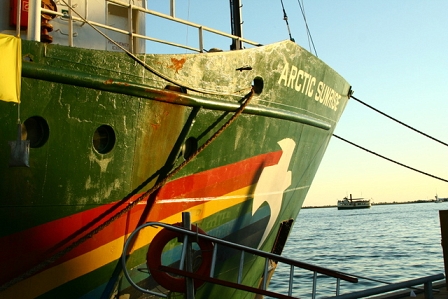Erstellt am: 10. 1. 2015 - 12:07 Uhr
Protesting for the environment in Russia
Andrey Allakhverdov on Reality Check
Dieses Element ist nicht mehr verfügbar
A criticism aimed at the Russian government in light of the current economic crisis is that over the last 20 years, the system has failed to use the money generated from oil and gas reserves to diversify the economy and build up other areas of industry. In the good times it's meant many have got far richer via oil and gas but with so much emphasis placed upon its mineral wealth, what happens if the oil price fluctuates.
Few in the Kremlin seemed to be paying attention to the doomsday scenarios that Russia could face. Now, reality is starting to set in: oil prices have indeed roughly halved in the past six months. Indra Overland, a Russia expert at the Norwegian Institute of International Affairs in Oslo, was quoted on Wednesday in the South China Morning Press as saying: "Russia is a petro-state ... falling prices meant job losses throughout the large chain of energy suppliers ... as the oil prices fall, so does Russia."

Public Domain
So what does Russia do?
Well, as the world's largest natural gas exporter, it keeps on drilling for one thing, that's all it can do. Not only that, but every area of Russia is up for exploration it seems, huge swathes of natural forest, Arctic shelf seas, forget any environmental concerns, the Kremlin feels it can drill its way out this crisis.
There are lone voices within Russia who are echoing the worry about the possible longterm effects on the environment. But it is often a dangerous path that environmentalists tread and they are portrayed somewhat negatively by state-controlled media in Russia.
Take the Prirazlomnoye field which lies in the Pechora Sea in the Arctic. It was discovered in 1989 and it's thought that there are 72 million tonnes of oil reserves lying under the water of this particular field. Oil production from the Prirazlomnoye field began in December of 2013 with a single platform. In fact the Pirazlomnaya is Russia's first oil platform in the Arctic shelf, but the government is suggesting that oil drilling in Arctic waters would be significantly expanded, with two Russian companies allowed to drill there: Gazprom and Rosneft.
The worry for enviromentalists like Greepeace is that as drilling companies step up their efforts operating in Arctic waters, this is also one of the last regions of untouched beauty as well as an oasis for wildlife. One leak or spill could endanger the very delicate ecosystem that's being allowed to develop there over tens of thousands of years. In fact, Greenpeace spelled out their concerns in 2012 in a document they called "Prirazlomnaya Oil Spill Would Threaten Russian Arctic With Irreparable Disaster".
So with all of this in mind, in September of 2013, the Greenpeace ship "Arctic Sunrise" set off and headed for the Pirazlomnaya platform. It's aim was for activists to board the platform if possible to prevent it from drilling. The Russian government was determined to prevent this and any similar future action from Greenpeace. So the "Arctic Sunrise" was stormed by Russian security officers in international waters in the Barents Sea. 30 activists were held at gunpoint as their ship was towed into a Russian port.
The arrested group became known as the "Arctic 30" and their case made international headlines as they were slapped first with charges of piracy, reduced to a then lesser charge of hooliganism, a crime which carried a maximum seven year jail sentence.
One of the "Arctic 30" is Andrey Allakhverdov. After two months in prison he was given an amnesty and allowed to go free. He's still working for Greenpeace in Moscow and is very engaged in environmental concerns and the groups campaigning. But he knows the challenges he and his colleagues face, based on his own personal experiences.
Reality Check Special
Andrey Allakhverdov spoke with me and reflected about that time aboard the "Arctic 30", just as the Russian forces were approaching their boat. The story of what happened to him and his colleagues on the ship and his subsequent time spent in prison, can be heard by clicking the player at the top or via our 7 days catchup.


